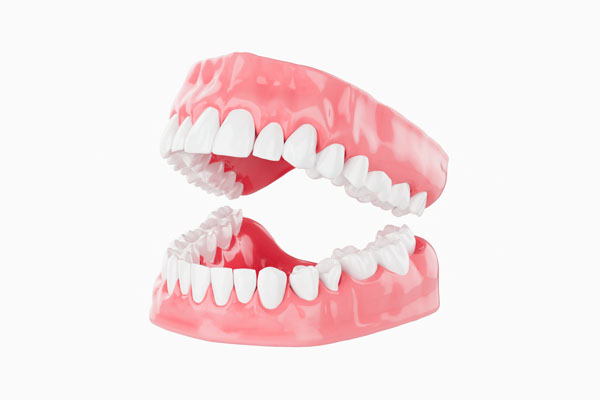 You might not expect to need denture adjustments after being fitted for a brand-new set of dentures. However, even a new appliance might need adjusting early on.
You might not expect to need denture adjustments after being fitted for a brand-new set of dentures. However, even a new appliance might need adjusting early on.
During the first month, it is essential to pay careful attention to the comfort and feel of your new dental prosthetic. It is normal to experience an adjustment period while your mouth gets used to the appliance. That said, it can be hard to tell if early discomfort is part of the standard transition period or a sign that the dentures are not correctly fitted.
Wearing, talking, and eating with dentures will help your mouth get used to the feel of the prosthetic. The discomfort will fade if they are properly fitted. However, the soreness will not resolve on its own if poor-fitting dentures are to blame.
Denture adjustments with new dentures
Many patients are wondering what to expect while adjusting to new dentures. Here are common questions and answers about wearing new dentures and getting denture adjustments.
What is the transitional period like for new dentures?
Patients commonly experience a short transitional period as the mouth gets used to the new prosthetic. The patient may feel soreness in the jaw, gums, and cheeks because their mouth is not used to the dentures.
How long does soreness last with new dentures?
The expected soreness should not last long when adjusting to a new set of dentures — only about two weeks. If the soreness persists for longer, the dentures may not be fitted appropriately. The patient should contact their dentist to ask about denture adjustments.
What foods can a patient eat with new dentures?
During the first few days, the patient may find that it is best to enjoy soft foods that are easy on the jaw. The gums, jaw, and cheeks may already be stressed from the new dentures. Soft foods are easy to chew and allow the mouth to rest.
How often should dentures be adjusted?
The need for denture adjustment will vary by patient. Patients should visit their dentist at least once a year for regular checkups. It may be necessary to visit the dentist for additional adjustments if the dentures feel too loose or tight.
How often are dentures replaced?
Typically, a patient should replace their dentures about every seven to 10 years. Their longevity may depend on how well the patient cares and cleans for them. It is crucial to inspect the dentures regularly for cracks and damage so weaknesses in the dentures can be addressed and repaired immediately.
Contact us for denture adjustments
Minor discomfort during the first two weeks is typical. However, the soreness should fade after that. Let your dentist know about any lasting pain or soreness, as your dentures should not be uncomfortable or painful in your mouth. Do not delay getting adjustments, as sores caused by dentures could cause more problems down the road.
Request an appointment or call Visalia Care Dental at 559-975-1213 for an appointment in our Visalia office.
Related Posts
Wear and tear make denture repairs inevitable in the long run. This is why a general dentistry practice that deals with dentures should have in-house facilities for minor and moderate repairs. The practice should also have quick access to a dental lab in case a patient needs major repairs for their dentures. Knowing when to…
Denture adjustments and repairs can fix all kinds of wear and tear on your artificial teeth. They are a necessary and inevitable part of life when you have dentures.The maintenance of dentures will require one or more adjustments to keep the prosthetics in good shape. A dentist may oversee the repair of a crack or…
Denture adjustments ensure that life with dentures lines up with what you sign up for. A set of dentures is not a true replacement for natural teeth, but it should come close. This is where routine maintenance of your prosthetic teeth comes in.Wearing your dentures should be an easy task that only takes a few…
